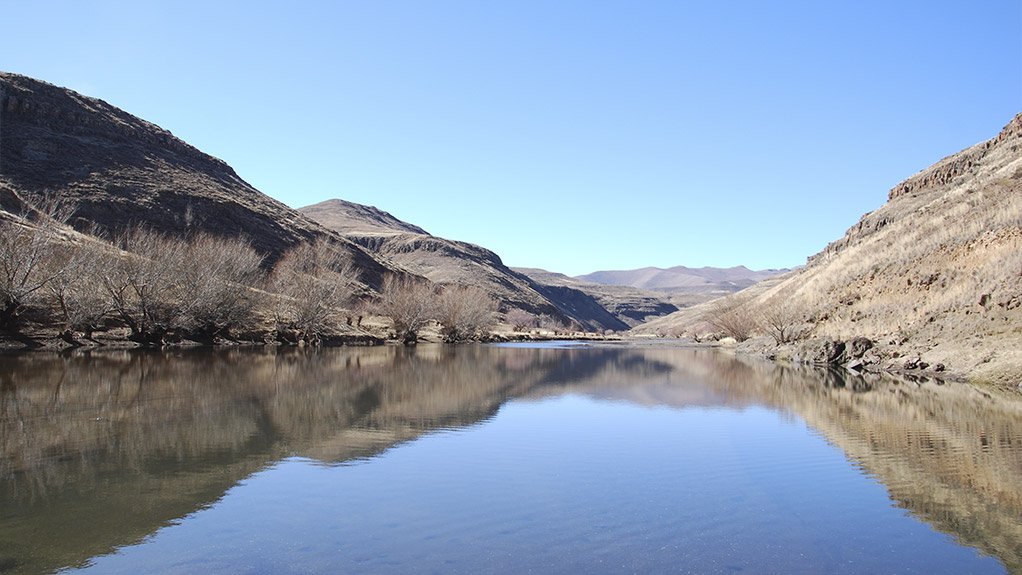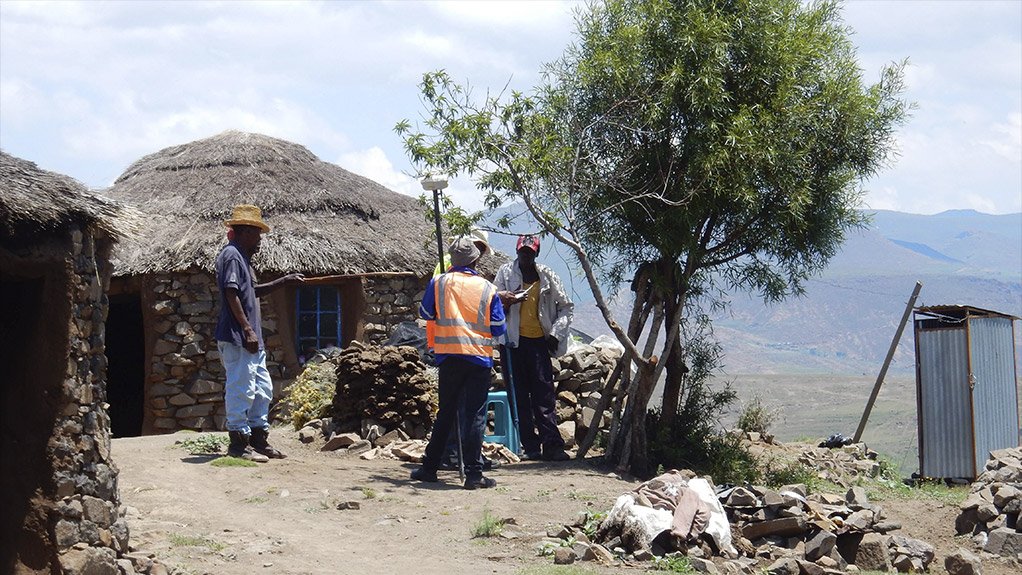Water project underway and making progress



DAM BIG PROJECT The site of the 2.3-billion-cubic-metre Polihali dam
ASSET ASSESSMENT Programmes to mitigate the impact of the project are being implemented in the affected communities
Last month, the official ground-breaking function for Phase II of the Lesotho Highlands Water Project (LHWP) took place and was attended by Kingdom of Lesotho Minister of Water Samonyane Ntsekele and South Africa Human Settlements, Water and Sanitation Minister Lindiwe Sisulu.
“Implementing Phase II of LHWP is ‘maths and music’,” says Lesotho Highlands Development Authority (LHDA) CE Tente Tente.
He explains that it is the maths of delivering a highly technical project comprising multiple engineering components within a specific timeframe and budget, and music in the sense of the softer skills of diplomacy; communication and social, environmental and community protection.
Tente notes that binational, multidisciplinary projects are complex by nature, requiring robust project management processes, rigorous adherence to timeframes and effective communication.
“The LHWP Phase II is no exception to this and while the project is behind the timelines proposed in the feasibility report, given the two-year deferred start, Phase II is making steady progress,” he points out.
Construction of the advance infrastructure of the Polihali transfer tunnel has commenced and will be largely completed before the start of the main works in 2020.
He points out that the first contractors for the construction of some of the advance infrastructure components for Phase II were appointed towards the end of 2018 with actual construction commencing early this year.
Based on current projections, the completion of the Polihali dam is scheduled for May 2025 with the tunnel expected to be completed in early 2026.
The two priorities of the project are to ensure participation of Lesotho and emerging South African companies in Phase II, as well as to mitigate the impact of the project on communities in the project area.
The Phase II agreement stipulates that Lesotho and South African consultants and contractors share equally the monetary value of the Phase II infrastructure works – excluding major works such as the dam and tunnel.
Moreover, consultancy contracts have specified minimum participation levels by Lesotho and South African enterprises and are awarded preference points to encourage collaboration with local companies and the inclusion of Basotho in management teams as a way of achieving the desired 50/50 split overall.
The minimum requirements have also varied across contracts to suit the particular contract/scope of work and local capacity for delivering such.
Further, minimum preference targets have also been set for the infrastructure construction contracts, some of which are suitable for substantial Lesotho participation, for example feeder roads, ancillary public buildings, resettlement housing and the infrastructure building contracts.
Moreover, contracts have been structured to encourage subcontracting to smaller local contractors under a lead contractor.
As with most large-scale infrastructure development projects, Phase II will have an impact on many people in the project area, most of whom are subsistence farmers living on ancestral land.
“The LHDA is sensitive to the importance of land ownership and to the impact of compulsory land acquisition. Therefore, it is implementing measures to ensure that people affected by the project will be enabled to maintain a standard of living not inferior to what it was prior to disturbance by the project,” says Tente.
The expropriation will necessitate the resettlement and compensation of some households who will lose their homes and their economic resource, and compensation for the loss of economic resource for others.
The exact number of households affected is being determined in the resettlement planning process which is currently underway.
The planning process involves working closely with community leadership structures and individual households to identify all affected people; to register and verify their assets for compensation purposes, and to prepare compensation and mitigation agreements with them for the loss of their assets.
He adds that every aspect of the process involves extensive consultation with the affected peoples.
A livelihood restoration programme complements resettlement and compensation to help mitigate the impact of resettlement on affected communities. Now at an advanced stage of planning with pilot/demonstration projects set to commence in the affected areas during the year, it offers support to affected households through projects of their choice with advice from LHDA and external experts.
These projects will include land-based options including crop and livestock production and wage-based options inclusive of a construction skills training programme. Subsequent enterprise-based income generating projects such as vegetable tunnels, village chickens and apiculture will also be offered.
Demonstration projects are underway and financial literacy education workshops have been held with communities in the project area. The purpose of these workshops is to help the communities to manage their compensation payments to support sustainable livelihoods.
A Social Development Master Plan will be prepared and implemented in consultation with local communities and key government and nongovernment stakeholders. This will ensure that the projects address the needs of the people concerned and have potential for viability and sustainability.
Article Enquiry
Email Article
Save Article
Feedback
To advertise email advertising@creamermedia.co.za or click here
Press Office
Announcements
What's On
Subscribe to improve your user experience...
Option 1 (equivalent of R125 a month):
Receive a weekly copy of Creamer Media's Engineering News & Mining Weekly magazine
(print copy for those in South Africa and e-magazine for those outside of South Africa)
Receive daily email newsletters
Access to full search results
Access archive of magazine back copies
Access to Projects in Progress
Access to ONE Research Report of your choice in PDF format
Option 2 (equivalent of R375 a month):
All benefits from Option 1
PLUS
Access to Creamer Media's Research Channel Africa for ALL Research Reports, in PDF format, on various industrial and mining sectors
including Electricity; Water; Energy Transition; Hydrogen; Roads, Rail and Ports; Coal; Gold; Platinum; Battery Metals; etc.
Already a subscriber?
Forgotten your password?
Receive weekly copy of Creamer Media's Engineering News & Mining Weekly magazine (print copy for those in South Africa and e-magazine for those outside of South Africa)
➕
Recieve daily email newsletters
➕
Access to full search results
➕
Access archive of magazine back copies
➕
Access to Projects in Progress
➕
Access to ONE Research Report of your choice in PDF format
RESEARCH CHANNEL AFRICA
R4500 (equivalent of R375 a month)
SUBSCRIBEAll benefits from Option 1
➕
Access to Creamer Media's Research Channel Africa for ALL Research Reports on various industrial and mining sectors, in PDF format, including on:
Electricity
➕
Water
➕
Energy Transition
➕
Hydrogen
➕
Roads, Rail and Ports
➕
Coal
➕
Gold
➕
Platinum
➕
Battery Metals
➕
etc.
Receive all benefits from Option 1 or Option 2 delivered to numerous people at your company
➕
Multiple User names and Passwords for simultaneous log-ins
➕
Intranet integration access to all in your organisation




















